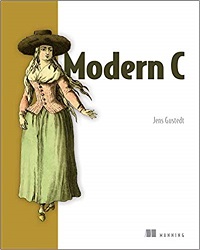
|
FreeComputerBooks.com
Links to Free Computer, Mathematics, Technical Books all over the World
|
|
- Title: Modern C
- Author(s) Jens Gustedt
- Publisher: Manning, 1 edition (July 7, 2019); eBook (Creative Commons Licensed, 2021)
- License(s): Creative Commons License (CC)
- Paperback: 408 pages
- eBook: PDF and ePub
- Language: English
- ISBN-10/ASIN: 1617295817
- ISBN-13: 978-1617295812
- Share This:

|
This book teaches you to take your C programming skills to new heights, whether you're just starting out with C or have more extensive experience. Organized by level, this comprehensive guide lets you jump in where it suits you best while still reaping the maximum benefits.
Programs and systems written in C are all around us: in personal computers, phones, cameras, set-top boxes, refrigerators, cars, mainframes, satellites, basically in any modern device that has a programmable interface.
About the Authors- Jens Gustedt is a senior scientist at the French National Institute for Computer Science and Control (INRIA).

- Modern C (Jens Gustedt)
- The Mirror Site (1) - PDF
- The Mirror Site (2) - PDF
- The Book Homepage (Source Code, etc.)
-
 Beej's Guide to C Programming (Brian Hall)
Beej's Guide to C Programming (Brian Hall)
This book introduces you to the most commonly used programming language, for computer users who would want to have an idea what is happening behind the scenes as they work with various computer programs.
-
 Expert C Programming: Deep C Secrets (Peter van der Linden)
Expert C Programming: Deep C Secrets (Peter van der Linden)
This book is for the knowledgeable C programmer, this is a second book that gives the C programmers advanced tips and tricks. Organized to make it easy for the reader to scan to sections that are relevant to their immediate needs.
-
 O'Reilly® Using C on the UNIX System (David A. Curry)
O'Reilly® Using C on the UNIX System (David A. Curry)
This book provides a thorough introduction to the UNIX system call libraries. It is aimed at programmers who already know C, but who want to take full advantage of the UNIX programming environment.
-
 Extreme C (Kamran Amini)
Extreme C (Kamran Amini)
This book will teach you to use C's advanced low-level power to write effective, efficient systems. This intensive, practical guide will help you become an expert C programmer. The book is essential for anybody who wants to take their C to the next level.
-
 C In Depth (Deepali Srivastava)
C In Depth (Deepali Srivastava)
This book is written in a simple manner and is very easy to understand. It is the best book among all the C programming books.Proves to be very useful for beginner as well as advance programmers.
-
 A Book on C: Programming in C (Al Kelley, et al.)
A Book on C: Programming in C (Al Kelley, et al.)
The C language is demonstrated with numerous examples and extensive exercises that guide readers through each concept. Step-by-step "dissections" of program code reveal the underlying logic of the programs and include in-depth implementation details.
-
 C Programming (Wikibook)
C Programming (Wikibook)
A comprehensive look at the C programming language and its features. Basic computer literacy is assumed, but no special knowledge is needed. It takes you through basic programming concepts and shows you how to implement them in C.
-
 Deep C (and C++) by Olve Maudal and Jon Jagger
Deep C (and C++) by Olve Maudal and Jon Jagger
We will study small code snippets in C and C++, and use them to discuss the fundamental building blocks, limitations and underlying design philosophies of these wonderful but dangerous programming languages.
-
 The C Book: Featuring the ANSI C Standard, 2nd Edition
The C Book: Featuring the ANSI C Standard, 2nd Edition
This book presents an introduction to the C programming language, featuring a structured approach and aimed at professionals and students with some experience of high-level languages, includes highlights of common traps and pitfalls in C programming.
-
 Notes on Data Structures and Programming Techniques in C
Notes on Data Structures and Programming Techniques in C
There are two purposes to this book: to teach you to program in the C programming language, and to teach you how to choose, implement, and use data structures and standard programming techniques.
-
 Object-Oriented Programming with ANSI-C (A. Schreiner)
Object-Oriented Programming with ANSI-C (A. Schreiner)
This book is not going to praise object-oriented programming or condemn the Old Way. It's simply going to use ANSI-C to discover how object-oriented programming is done, what its techniques are, why they help us solve bigger problems,
-
 Pointers and Memory (Nick Parlante, et al.)
Pointers and Memory (Nick Parlante, et al.)
This is an introduction to programming with pointers and memory in C, C++ and other languages. Explains how pointers and memory work and how to use them -- from the basic concepts through all the major programming techniques.
-
 Scientific Programming and Computer Architecture
Scientific Programming and Computer Architecture
The book digs into linkers, compilers, operating systems, and computer architecture to understand how the different parts of the computer interact with programs. It begins with a review of C/C++ and explanations of how libraries, linkers, and Makefiles work.





